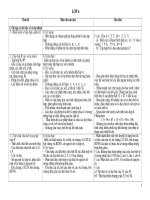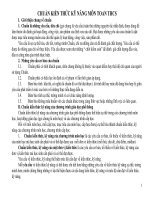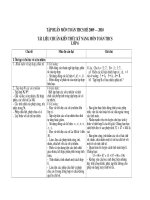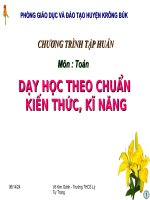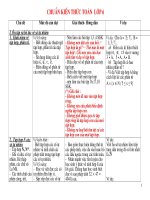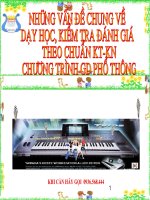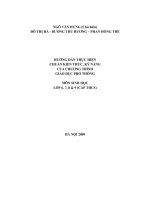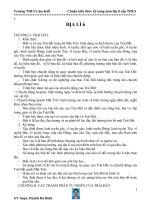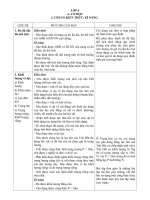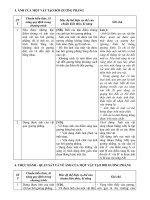Chuan kien thuc ky nang bac THCS
Bạn đang xem bản rút gọn của tài liệu. Xem và tải ngay bản đầy đủ của tài liệu tại đây (115.23 KB, 23 trang )
<span class='text_page_counter'>(1)</span><div class='page_container' data-page=1>
<b>CHUYÊN ĐỀ</b>
<b>CHUẨN KIẾN THỨC, KĨ NĂNG MÔN TIẾNG ANH THCS</b>
<b>PHẦN MỘT</b>
<b>GIỚI THIỆU CHUNG VỀ CHUẨN KIẾN THỨC, KĨ NĂNG CỦA</b>
<b>CHƯƠNG TRÌNH GIÁO DỤC PHỔ THƠNG</b>
<b>I. GIỚI THIỆU CHUNG VỀ CHUẨN KIẾN THỨC</b>
<b>1. Chuẩn là những yêu cầu, tiêu chí (gọi chung là yêu cầu) tuân thủ những</b>
nguyên tắc nhất định, được dùng để làm thước đo đánh giá hoạt động, công việc, sản
phẩm của lĩnh vực nào đó. Đạt được những yêu cầu của chuẩn là đạt được mục tiêu mong
muốn của chủ thể quản lí hoạt động, cơng việc sản phẫm đó.
u cầu là sự cụ thể hóa, chi tiết, chương trình Chuẩn, chỉ ra những căn cứ để
đánh giá chất lượng. Yêu cầu có thể được thơng qua chỉ số thực hiện. u cầu được xem
như những “chốt kiểm soát” để đánh giá chất lượng đầu vào, đầu ra củng như quá trình
thực hiện.
<b>2. Những yêu cầu cơ bản của Chuẩn:</b>
2.1. Chuẩn phải có tình khách quan, nhìn chung khơng lệ thuộc cào quan
điểm hay thái độ chủ quan của người sử dụng Chuẩn.
2.2. Chuẩn phải có hiệu lực ổn định cả lề phạm vi lẫn thời gian áp dung.
2.3. Đảm bảo tính khã thi, có nghĩa là Chuẩn đó có thể đạt được (là trình
độ hay mức độ dung hịa hợp lí gữa yêu cầu phát triển ở mức độ hơn thực tiển đang diễn
ra).
2.4. Đảm bảo tính cụ thể, tường minh và những chức năng định lượng.
2.5. Đảm bảo không mâu thuẫn với các chuẩn khác trong cùng lĩnh vực
hoặc những lĩnh vực có liên quan.
<b>II. CHUẨN KIẾN THỨC, KĨ NĂNG CỦA CHƯƠNG TRÌNH GIÁO DỤC</b>
<b>PHỔ THƠNG:</b>
Chuẩn kiến thức, kĩ năng là yêu cầu về thái độ của chương trình giáo dục phổ
thơng được thể hiện cụ thể trong các chương trình mơn học, hoạt động giáo dục (gọi
chung là mơn học) và các chương trình cấp học.
Đối với mỗi môn học, mỗi cấp học, mục tiêu của mơn học, cấp học được cụ thể
hóa thành chuẩn kiến thức, kĩ năng của chương trình mơn học, chương trình cấp học.
<b>1. Chuẩn kiến thức, kĩ năng của chương trình môn học là các yêu cầu cơ bản,</b>
tối thiểu về kiến thức, kĩ năng của môn học mà học sinh cần phải cụ thể đạt được sdau
mỗi đơn vị kiến thức (mỗi bài, chủ đề, chủ điểm, mô đun).
<i><b>Chuẩn kiến thức, kĩ năng của đơn vị kiến thức </b></i>là các yêu cầu cơ bản, tối thiểu về
kiến thức, kĩ năng của đơn vị kiến thức mà học sinh cần phải và có thể đạt được.
</div>
<span class='text_page_counter'>(2)</span><div class='page_container' data-page=2>
<b>2. Chuẩn kiến thức, kĩ năng của chương trình cấp học là các yêu cầu cơ bản, tối</b>
thiểu về kiến thức, kĩ năng của các môn học mà học sinh cần phải và có thể đạt được sau
từng giai đoạn học tập trong cấp học.
<b>2.1. Chuẩn kiến thức, kĩ năng ở chương trình các cấp học đề cập tối thiểu về kiến</b>
thức, kĩ năng mà học sinh cần có thể đạt được sau khi hồn thành chương trình giáo dục
của từng lớp và từng cấp học. Các chuẩn này cho thấy ý nghĩa quan trọng của việc gắn
kết, phối hợp giữa các môn học nhằm đạt được mục tiêu giáo dục của cấp học.
<b>2.2. Việc thể hiện chuẩn kiến thức, kĩ năng ở chương trình cấp học thể hiện hình</b>
mẫu mong đợi về người học sau mỗi cấp học và cần thiết cho cơng tác quản lí, chỉ đạo
đào tạo, bồi dưỡng giáo viên.
<b>III. CÁC MỨC ĐỘ VỀ KIẾN THỨC, KĨ NĂNG:</b>
Các mức độ về kiến thức, kĩ năng được thể hiện cụ thể trong Chuẩn kiến thức, kĩ
năng của chương trình giáo dục phổ thơng.
<b>Về kiến thức: u cầu học sinh phải nhớ, nắm vững, hiểu rõ các kiến thức cơ bản</b>
trong chương trình sách giáo khoa, đó là nền tảng vững vàng để phát triển năng lực nhận
thức ở cấp cao hơn.
<b>Về kĩ năng: biết vận dụng kiến thức đã học để trả lới các câu hỏi, giải bài tập …</b>
<b>IV. CHUẨN KIẾN THỨC , KĨ NĂNG VỀ KIỂM TRA ĐÁNH GIÁ:</b>
<b>1. Quan niệm về kiểm tra đánh giá:</b>
Kiểm tra đánh giá là hai khâu trrong một qui trình thống nhất nhằm xác định kết
quả thực hiện mục tiêu dạy học. Kiểm tra là thu thập thông tin từ riêng lẽ đến hệ thống
về kết quả thực hiện mục tiêu dạy học; đánh giá xác định mức độ đạt được về thực hiện
mục tiêu dạy học.
<b>2. Hai chức năng cơ bản của kiểm tra đánh giá:</b>
<b>a. Chức năng xác định:</b>
- Xác định mức độ đạt được trong việc thực hiện mục tiêu dạy học , xác định mức
độ thực hiện Chuẩn kiến thức, kĩ năng của trương trình giáo dục mà học sinh đạt được khi
kết thúc một giai đoạn học tâp (Kết thúc một bài, chương, chủ đề, chủ điểm …)
- Xác định địi hỏi tính chính xác, khách quan, công bằng.
<b>b. Chức năng điều khiển:</b>
Phát hiện những mặt tốt, chưa tốt, khó khăn, vướng mắt và xác định nguyên nhân.
Kết quả đánh giá là căn cứ để quyết định những giải pháp cải thiện thực trạng, nâng cao
chất lượng, hiệu quả dạy học và giáo dục thơng việc đổi mới, tối ưu hóa phương pháp dạy
học của giáo viên và hướng dẫn học sinh biết tự đánh giá tối ưu hóa phương pháp học tập.
Thơng qua các chức năng nà, kiểm tra, đánh giá sẽ là điều kiện cần thiết.
- Giúp giáo viên nắm được tình hỉnh học tập, mức độ phân hóa về trình độ học lực
của học sinh trong lớp, từ đó có biện pháp giúp đở học sinh yếu kém và bồi dưỡng học
sinh giỏi.
- Giúp học sinh biết được khã năng học tập của mình so với yêu cầu của chương
trình, xác định ngun nhân thành cơng, từ đó điều chỉnh phương pahp1 học tập, phát
triển kĩ năng tự đánh giá.
- Giúp cha mẹ học sinh và cộng đồng biết được kết quả giáo dục của từng học
sinh, từng lớp và của cả cơ sở giáo dục.
</div>
<span class='text_page_counter'>(3)</span><div class='page_container' data-page=3>
Kiểm tra đánh giá phải căn cứ vào chuẩn kiến thức, kĩ năng của từng môn học ở
từng lớp, các yêu cầu cơ bản tối thiểu cần đạt về kiến thức, kĩ năng của học sinh.
<b>4. Các tiêu chí của kiểm tra, đánh giá:</b>
<b>a. Đảm bảo tính tồn diện: đánh giá các mặt kiến thức, kĩ năng, năng lực, ý thức</b>
thái độ, hành vi của học sinh.
<b>b. Đảm bảo độ tin cậy: Tính chính xác, trung thực, minh bạch, khách quan, công</b>
bằng trong đánh giá,phản ánh được chất lượng thực của học sinh.
<b>c. Đảm bảo tính khả thi: Nội dung hình thức,cách thức phương tiện tổ chức kiểm</b>
tra, đánh giá phải phù hợp với điểu kiện học sinh.
<b>d. Đảm bảo u cầu phân hóa: Phân loại được chính xác trình độ , mức độ, năng</b>
lực nhận thức của học sinh, cần đảm bảo dải phân hóa rộng đủ cho phân loại đối tượng.
<b>e. Đảm bảo hiệu quả: Đánh giá được tất cả các lỉnh vực cần đánh giá học sinh,</b>
thực hiện đầy đủ các mục tiêu đề ra, tạo động lực đổi mới phương pháp dạy học, góp
phần nâng cao chất lượng giáo dục.
<b>PHẦN HAI</b>
<b>CHUẨN KIẾN THỨC, KĨ NĂNG MƠN TIẾNG ANH THCS</b>
<b>LỚP 6</b>
<b>I. KHÁI QUÁT VỀ MỨC ĐỘ CẦN ĐẠT:</b>
Hết lớp 6, học sinh có khã năng sữ dụng những kiến thức tiếng Anh đã học trong
phạm vi chương trình để:
<b>Nghe:</b>
- Nghe hiểu được các câu mệnh lệnh và nói đơn giản thường dùng trên lớp học.
- Nghe hiểu những câu nói, câu hỏi – đáp đơn giản với tổng độ dài khoảng 40 –
60 từ về thông tin cá nhân, gia đình và nhà trường.
<b>Nói:</b>
- Hỏi – đáp đơn giản về thơng tin cá nhân, gia đình và nhà trường trong phạm vi
các chủ điểm có trong chương trình.
- Thực hiện một số chức năng giao tiếp đơn giản: chào hỏi, đưa ra thực hiện
mệnh lệnh, nói ví trí đồ vật, hỏi – đáp về thời gian, miêu tả người, miêu tả thời
tiết, …
<b>Đọc:</b>
- Đọc hiểu nội dung chính các đoạn độc thoại hoặc hội thoại đơn giản, mang tính
thơng báo với độ dài khoảng 50-70 từ, xoay quanh các chủ điểm có trong
chương trình.
<b>Viết:</b>
</div>
<span class='text_page_counter'>(4)</span><div class='page_container' data-page=4>
<b>II. TRỌNG TÂM KIẾN THỨC, KĨ NĂNG:</b>
1. CHỦ ĐIỂM (THEME 1: PERSONAL INFORMATION:
- Oneself
- Friends
- House and family
- <b>Speaking:</b>
- Gretting people
- Say good bye
- Identify oneself and others
- Introduce oneself and others
- Ask how people are
- Talk about someone’s age
- Ask for and give numberd
- Count to 100
- Describle family and family members
- Identify places, people and objects
<b>Listening:</b>
Listen to monologues/dialogue with 50 words for general information
<b>Reading:</b>
Read dialogue with 50 – 70 words for general information
<b>Writing:</b>
Write about oneself. One’s family or friends with 40 – 50 words using suggested
idea, words or picture cues.
<b>Grammar:</b>
- Present simple of <i>to be (am, is are)</i>
- Wh-questions: <i>How? How old? How many? What? Where? Who?</i>
- Personal pronouns: <i>I,we, she, he, you, they</i>
- Posseive pronouns: <i>my, her, his, your</i>
- Indefinite articles: <i>a/an</i>
- Impertive (commands): <i>come in, sitdown, stand up</i>
- <i>This/That/These/Those</i>
- <i>There is … / There are …</i>
<b>Vocabulary:</b>
- Names of household objects: <i>living room, chair, steo, …</i>
- Words desribing family members: <i>father, mother, brother, sister, …</i>
- Names of occupations: <i>engineer, teaher, student, ..</i>
- Nambers to 100
<b>2. CHỦ ĐIỂM (THEME 2: EDUCATION</b>
- School facilities and activities
- Children’s life in the school.
<b>Speaking:</b>
</div>
<span class='text_page_counter'>(5)</span><div class='page_container' data-page=5>
- Desribe school timetables
- Descibe classrooms/classroom objects/locations of objects
- Give and obey orders
<b>Listening:</b>
Listen to monologues/dialogues within 50 words for general information
<b>Reading:</b>
Read dialogue with 50 – 70 words for genaral information
<b>Writing:</b>
Write sentences or a parapraph within 50 words with idea/word or picture cues.
<b>Grammar:</b>
- Present simple: <i>have, get up, brush, wash, go</i>
- <i>Wh-</i>questions: <i>What time?How many? Which?</i>
- Yes/ No questions: <i>Do/Does</i>
- Possessive cave
- Adjectives: <i>big, small, beautiful</i>
- Prepositions of time: <i>at, on, in</i>
- Prepositions of places: <i>at, on, in</i>
<b>Vocabulary:</b>
- Words describing school facilities:<i> school, classroom, floor, …</i>
- Words to talk about school subjects: <i>english, Math, literature, …</i>
- Words describing a timetable: <i>Monday, Tuesday, …</i>
- Ordinal numbers to <i>tenth</i>
- Words describing time: <i>(a quarter) to, past, half past, …</i>
<b>3. CHUÛ ÑIEÅM (THEME 3: COMMUNITY</b>
- In and around the house
- Places in town/city and country
- Transportation
<b>Speaking:</b>
- Give personal details
- Describe household objects
- Identify places and their layouts
- Talk about habitual actions
- Identify means of transportation and road signs
- Describe on-going activities
<b>Listening:</b>
Listen to monologues/dialogue with 50 words for general information
<b>Reading:</b>
Read dialogue with 50 – 70 words for genaral information
<b>Writing:</b>
Write sentences or a parapraph within 50 words with idea/word or picture cues.
<b>Grammar:</b>
</div>
<span class='text_page_counter'>(6)</span><div class='page_container' data-page=6>
- <i>Wh-</i>questions: <i>How? Where? Which? What?</i>
- <i>Yes/No</i> questions: <i>Is there…? Are there…? Do you …?</i>
- Adjectives: <i>quiet, noisy</i>
- Adverbial phrases:<i> next to, behind, between</i>
- Articles: <i>a, an, the</i>
<b>Vocabulary:</b>
- Names of public places in the community:<i>restaurant, bookstore, temple, …</i>
- Means of transportant: <i>car, train, plane, truck, …</i>
<b>4. CHỦ ĐIỂM (THEME 4: NATURE</b>
- Parts of the body
- Health
- Food and drinks
- The menu
<b>Speaking:</b>
- Identify parts of the body
- Describe people’s appearance
- Talk about feelings, wants and needs
- Use approriate langauge in buying food and drinks
- Talk about qualities and prices
<b>Listening:</b>
Listen to monologues/dialogue with 50 words for general information
<b>Reading:</b>
Read dialogue with 50 – 70 words for genaral information
<b>Writing:</b>
Write sentences or a parapraph within 50 words with idea/word or picture cues.
<b>Grammar:</b>
- Present simple
- <i>Wh-</i>questions: <i>How much? How many? What color?</i>
- <i>Yes/No </i>Questions:<i>Can you…?</i>
- Polite requests: <i>Would you …?/Do you like…?</i>
- Quantifiers: <i>some, any</i>
- Partitives: <i>a bootle of, a can of</i>
<b>Vocabulary:</b>
- Words describing parts of the body: <i>head, leg, …</i>
- Color: <i>gray, red, orange, …</i>
- Words describing people’s appearance and feelings: <i>tall, short, thin, hot,</i>
<i>thirsty, hungry, tired, cold, …</i>
- Names of food and drinks: <i>apple, break, rice,meat, milk, …</i>
- Kinds of currency: <i>VND, US$</i>
<b>5. CHỦ ĐIỂM (THEME 5: RECREATION</b>
- Sports/games and pastime
</div>
<span class='text_page_counter'>(7)</span><div class='page_container' data-page=7>
- Plans
<b>Speaking:</b>
- Talk about sports and pastime activities
- Talk about frequency
- Express perferences
- Descibe the weather
- Talk about vocation/free time plans
- Talk about duration
- Make suggestions
- Describe timetables
<b>Listening:</b>
Listen to monologues/dialogue with 50 words for general information
<b>Reading:</b>
Read dialogue with 50 – 70 words for genaral information
<b>Writing:</b>
Write sentences or a parapraph within 50 words with idea/word or picture cues.
<b>Grammar:</b>
- Tenses: simple present, present progressive
- <i>Wh-</i>questions: <i>which? How long? How often?</i>
- Adverbs of sequence: <i>first, then, next, after that, finaly</i>
- Adverbs of frequency: <i>ones a week, always, …</i>
- Adjectives: <i> hot, cold, …</i>
- Prepositions: <i>on, in, at, …</i>
- <i>Going to…</i>
- <i>What … like?</i>
- <i>Let’s</i> …
- <i>What about + verb-ing…?</i>
- <i>Why don’t you ….?</i>
- <i>Like + verb-ing</i>
<b>Vocabulary:</b>
- Names of sports and pastime activities: <i>badminton, socer, tennis, …</i>
- Words to talk about season and the weather: <i>spring, fall, cold, hot, …</i>
<b>6. CHỦ ĐIỂM (THEME 6: PEOPLE AND PLACES</b>
- Countries
- Environment
<b>Speaking:</b>
- Talk about countries, nationlities, languages
- State dimensions
- Indentify quantities
- Talk about occupations
- Make comparisions/suggestions
- Talk about environmental issues
</div>
<span class='text_page_counter'>(8)</span><div class='page_container' data-page=8>
Listen to monologues/dialogue with 50 words for general information
<b>Reading:</b>
Read dialogue with 50 – 70 words for genaral information
<b>Writing:</b>
Write sentences or a parapraph within 50 words with idea/word or picture
cues.
<b>Grammar:</b>
- Tenses: Simple present, present progressive
- Modal verbs: <i>Hoe long …? How high …?</i>
- Adjectives: <i>comparatives/superatives</i>
- Prepositions: <i>from, to</i>
- Indefinite quatifiers: <i>a lot of, a few, a little, some, …</i>
<b>Vocabulary:</b>
- Names of countries: <i>the USA, Great Britain, …</i>
- Nationlities: <i>Vietnamese, Bristish, American, Canadian, …</i>
- Names of language: <i>Vietnames, English, French, Chinese, ..</i>
- Names of natural features: <i>river, mountain, beach, forest, …</i>
- Words relating to environmental issues: <i>pollution, water, destroy, damage, …</i>
<b>LỚP 7</b>
<b>I. KHÁI QUÁT VỀ MỨC ĐỘ CẦN ĐẠT:</b>
Hết lớp 7, học sinh có khả năng sử dụng những kiến thức tiếng anh đã học trong
phạm vi chương trình để:
<b>Nghe:</b>
- Nghe hiểu được các đoạn hội thoại và độc thoại đơn giản về các nội dung chủ
điểm đã học trong chương trình.
- Hiểu được nội dung chínhcác đoạn hội thoại và độc thoại ở tốc độ chậm vừa
phải có độ dài khoảng 60-80 từ.
<b>Noùi:</b>
- Hỏi – đáp hoặc trao đổi thông tin cá nhân đơn giản, các hoạt động học tập, vui
chơi giải trí, và sinh hoạt hàng ngày.
- Thực hiện một số chức năng giao tiếp cơ bản: diễn đạt ý định, lời mời, lời
khuyên, góp ý, thu xếp thời gian địa điểm các cuộc hẹn, hỏi đường và chỉ
đường.
<b>Đọc:</b>
- Đọc hiểu nội dung các đoạn hội thoại hoặc hội thoại đơn giản, mang tính thơng
báo với độ dài khoảng 50 – 70 từ, xoay quanh các chủ điểm và có trong chương
trình.
<b>Viết:</b>
</div>
<span class='text_page_counter'>(9)</span><div class='page_container' data-page=9>
- Viết lại được các nội dung chính được diễn đạt qua nói.
<b>II. TRỌNG TÂM KIẾN THỨC, KĨ NĂNG:</b>
<b>1. CHỦ ĐIỂM (THEME 1: PERSONAL INFORMATION</b>
<b>Topic:</b>
- Friends
- Oneself and others
- House and home
<b>Speaking:</b>
- Identify oneself
- Introduce others
- Agree with others
- Ask for and give personal information
- Talk about addresses
- Talk about means of transport and distances
- Ask for and give telephone numbers
- Make arrangements
- Talk about date and months
- Describe rooms and homes/apartments
- Talk about occupations
<b>Listening:</b>
Listen to monologues/dialogue with 60 – 80 words for general information.
<b>Reading:</b>
Reading dialouges and passages within 80 -100 words for general or detailed
information.
<b>Writing:</b>
Write an informal letter of invatation within 50-60 words using suggested idea or
words.
<b>Grammar:</b>
- Tenses: present simple, future simple <i>(will, shall)</i>
- <i>Wh-</i>questions: <i>Why?, Where?, Which?, How far?, How long?</i>
- Adverbs of times: <i>still, till, untill</i>
- Indefinite quatifiers: <i>many, a lot of, lots of</i>
- Comparatives/superatives of adjectives
- Ordinal number
- Exclamations: <i>What </i>+ noun!
- Prepositions of position: <i>in, at, on, under, near, next to, behind …</i>
- Compound adjectives
<b>Vocabulary:</b>
- Names of occupations: <i>famer, doctor, nurse, engineer, journalist, …</i>
- Words describing dates and months: <i>Monday, Tuesday, January, February, …</i>
- Words describing house and home: <i>apartment, bookshelf, sofa, …</i>
- Phone numbers
- Words relating to distances: <i>meter, kilometer, …</i>
</div>
<span class='text_page_counter'>(10)</span><div class='page_container' data-page=10>
<b>Topic:</b>
- School facilities
- School activities
- School children’s life.
<b>Speaking:</b>
- Ask and say the time/timetable
- Talk about school subfects/schedules and regulations
- Talk about school libraries
- Ask for and give directions
- Ask about and describe class/recess activities
- Talk about popular after-school activities
- Make suggestions/arrangements
<b>Listening:</b>
Listen to monologues/dialogue with 60 – 80 words for general information.
<b>Reading:</b>
Reading dialouges and passages within 80 -100 words for general or detailed
information.
<b>Writing:</b>
Write a paragraph within 50-60 words about related topic with word/ picture cues
<b>Grammar:</b>
- Tenses: present simple, pesent progressive
- <i>Wh-</i>questions: <i>What? Where?</i>
- Modal verbs: <i>shuold, would</i>
- Prepositions of time: <i>in, on, at</i>
- Abverbs of frequency
- <i>This, that, these, those</i>
- <i>Would you like to …?</i>
- <i>Let’s …</i>
- <i>‘It” </i>indicating time.
<b>Vocabulary:</b>
- Names of school subjects:<i> Physical Education, Literature, Geography, …</i>
- Names of different kinds of books in the library:<i> magazine, science book,</i>
<i>reference book, …</i>
- Words describing activities at recess and sfter-school: <i>play catch/ marbles/</i>
<i>blind man’s bluff, go to school/ cafeteria/ the circus, watch a movie, tidy the</i>
<i>room, …</i>
<b>3. CHỦ ĐỀ (THEME 3: COMMUNITY</b>
<b>Topic:</b>
- Places in the community
- Neighborhood
<b>Speaking:</b>
- Talk about vacation
</div>
<span class='text_page_counter'>(11)</span><div class='page_container' data-page=11>
- Inquire about prices
- Make purchases
- Describe characters of friends and neighbor
- Talk about hobbies
- Talk abouot past events
- Describe a process
- Talk about occupations
<b>Listening:</b>
Listen to monologues/dialogue with 60 – 80 words for general information.
<b>Reading:</b>
Reading dialouges and passages within 80 -100 words for general or detailed
information.
<b>Writing:</b>
Write a process/ make notes within 50-60 words within word cues
<b>Grammar:</b>
- Tenses: present simple, past simple
- <i>Wh-questions: How much? How far?</i>
- Regular verbs. Irregular verbs
- Modal verbs: <i>can/ could</i>
- Comparatives of adjectives: <i>more, less, fewer</i>
- Adverbs of frequencey: <i>usually, often, sometimes, …</i>
- Prepositions of position: <i>next to, between, oposite, in front of, …</i>
- <i>“It” </i>indicating distance
<b>Vocabulary:</b>
- Words Describing a process: <i>first, then, next, …</i>
- Words to talk about vacation activities, routines, facilities, directions: <i>watch</i>
<i>vidio, read books, …</i>
- Words related to hobbies and characteristics: <i>collect stamps, favourite, ….</i>
- Words to talk about price and purcguses: <i>phone card, cost, change, expensive, …</i>
<b>4. CHỦ ĐỀ (THEME) 4: HEALTH</b>
<b>Topics:</b>
- Physical comfor
- Healthy living
<b>Speaking:</b>
- Talk about habits, routines and diaru entry
- Talk about a visit to the dentist
- Talk about common siknesses, symptoms, cures heslth and safety precautions
- Identify different kinds of food, menu, reipes
- Express prferences
- Describe how to make a meal
- Talk about diets
<b>Listening:</b>
</div>
<span class='text_page_counter'>(12)</span><div class='page_container' data-page=12>
<b>Reading:</b>
Reading dialouges and passages within 80 -100 words for general or detailed
information.
<b>Writing:</b>
- Write a guided letter /poster withi 50-60 words with picture cues
- Write menu within 50-60 words with the pie chat given
<b>Grammar:</b>
- Tense: past simple
- Questions forms, negatives forms
- Imperatives
- <i>Why, Because</i>
- <i>Too/ either</i>
- <i>So/ neither</i>
- <i>Would you like …; I’d like</i>
<b>Vocabulary:</b>
- Words to talk about gealth, symtoms and cures: <i>temperature, height, weight,</i>
<i>safety precaution, illnesses, medicine, …</i>
- Words to talk about different kinds od food, fruits and drinks, meals and diet:
<i>taste, smell, soya sauce, spinach, …</i>
- Words to talk about habits and routinces
<b>5. CHỦ ĐỀ (THEME) 5: RECREATION</b>
<b>Topic:</b>
- Sports
- TV and radio programs
- Video games
<b>Speaking:</b>
- Describe sporting/ free time activities
- Talk about hobbies
- Give advice
- Make and refuse an invitation
- Make suggestions
- Make inquiries and express preferences
- Talk abour TV and radio programs
- Talk about vidio games and their effects
<b>Listening:</b>
Listen to monologues/dialogue with 60 – 80 words for general information.
<b>Reading:</b>
Reading dialouges and passages within 80 -100 words for general or detailed
information.
<b>Writing:</b>
Write a paragraph within 60 -70 words with cues given.
<b>Grammar:</b>
</div>
<span class='text_page_counter'>(13)</span><div class='page_container' data-page=13>
- Adjectives and adverbs: <i>good/ well; slow/ slowly</i>
- Comparatives/ superatives of asdjectives
- Adverbs of manner: <i>skillfuly, badly, quickly</i>
- <i>Like/ prefer + to-infinitive</i>
- <i>What would you like to …?</i>
- <i>How about …? / What about ….?</i>
<b>Vocabulry:</b>
- Words to talk about sports, games, films, music: <i>athletic, championship,</i>
<i>cartoon, adventure, detective, …</i>
- Words to talk about TV and radio programs: <i>series, perform, satellite, …</i>
- Words to talk about / to compare city and country life: <i>quiet, noisy, crowded,</i>
<i>busy.</i>
<b>6. CHỦ ĐỀ (THEME) 6: THE WORLD AROUND US</b>
<b>Topic:</b>
- Gregraphy of Vietnam and Southeast Asia countries
- People and places
<b>Speaking:</b>
- Name countries and their capital cities
- Discuss vacation destinations
- Talk about tourist attactions
- Talk about fanous people and places
- Describe and compare city and village lifeastyle
<b>Listening:</b>
Listen to monologues/dialogue with 60 – 80 words for general information.
<b>Reading:</b>
Reading dialouges and passages within 80 -100 words for general or detailed
information.
<b>Writing:</b>
- Write a paragraph within 50-60 words with cues given
- Complete a table
<b>Grammar:</b>
- Tenses: present simple, past simple
- Modal verbs: <i>may/ can, </i>(review)
- Adverbs of frequency (review)
- <i>Why, Because </i>(review)
<b>Vocabulary:</b>
- Names of some countries and capital cities in Asia: <i>Thailand, Singapore,</i>
<i>Bangkok, Kuala Lumpur, …</i>
</div>
<span class='text_page_counter'>(14)</span><div class='page_container' data-page=14>
<b>LỚP 8</b>
<b>I. KHÁI QUÁT VỀ MỨC ĐỘ CẦN ĐẠT:</b>
Hết lớp 8, học sinh có khã năng sữ dụng những kiến thức tiếng Anh đã học trong
phạm vi chương trình để:
<b>Nghe:</b>
- Nghe hiểu được nội dung chính và nội dung chi tiết các đoạn độc thoại / hội
thoại trong phạm vi các nội dung chủ điểm đã học trong chương trình.
- Hiểu được các đối thoại / hội thoại có độ dài khoảng 80 – 100 từ ở tốc độ tương
đối chậm.
<b>Noùi:</b>
- Hỏi – đáp, miêu tả, kể, giải thích về các thông tin liên quan đến cá nhân, các
goạt động học tập, sinh hoạt vui chơi, giải trí.
- Thực hiện một số chức năng giao tiếp cơ bản: thơng báo, trình bày, diễn đạt lời
đề nghị, chấp nhận hoac95 từ chối lời đề nghị, diễn đạt lời hứa, …
<b>Đọc:</b>
- Đọc hiểu được nội dung chính và nội dung chi tiết các văn bản với độ dài
khoảng 110 – 140 từ xoay quanh các chủ điểm có trong chương trình.
- <b>Viết:</b>
- Viết theo mẫu có gợi ý đoạn văn có độ dài khoảng 60 – 80 từ về nội dung liên
quan đến các chủ điểm đã học để phục vụ các nhu cầu giao tiếp đơn giản như
viết thư cám ơn, hoặc viết lời mời, …
<b>II. TRỌNG TÂM KIẾN THỨC, KĨ NĂNG:</b>
<b>1. CHỦ ĐIỂM (THEME) 1: PERSONAL INFORMATION</b>
<b>Topic:</b>
- Friends
- House and home
<b>Speaking:</b>
- Introduce people and respond to introductions
- ]describe people’s appearance
- Make errangements
- Talk about intentions
- Ask for and give reasons
- Talk about past events
<b>Listening:</b>
Students will be able to:
Listen to monologues/ dialogues within 80-100 words for general or detailed
information.
<b>Reading:</b>
Students will be able to:
</div>
<span class='text_page_counter'>(15)</span><div class='page_container' data-page=15>
<b>Writing:</b>
Students will be able to:
Write about oneslf / others / a description of a room in the house within 70 – 80
words cues / pictures
<b>Grammar:</b>
- Presents simple, past simple
- Future with <i>be going to</i>
- Reflexive pronouns: <i>yourself, mrdself, themselves</i>
- Modal verbs: <i>must, have to , ought to</i>
- Averbs of place: <i>here, there, upstairs, downstairs, …</i>
- <i>Adjectives +</i>too / enough + to –infinitive
- Prepositions of time
- <i>Let’s</i>
- Wht – Because
<b>Vocabulary:</b>
- Words descrbing house and home: <i>rug, aimchair, couch, oven, sink, cooker, …</i>
- Names of telecommunication devices: <i>fax machine, mobile phone, …</i>
Words decribing appearance: <i>thin, tall, short, ..</i>
<b>2. CHUÛ ÑIEÅM (THEME) 2: EDUCATION</b>
<b>Topic:</b>
- Our part
- School life and study habits
<b>Speaking:</b>
Students will be able to:
- Ask for anf repond to favors
- Gie advice and instructions
- Express obligation
- Offer and repond to assistance
- Talk about study habits
- Talk about future plans
<b>Listening:</b>
Students will be able to:
Listen to monologues/ dialogues within 80-100 words for general or detailed
information.
<b>Reading:</b>
Students will be able to:
Read dialogue / passages within 110 – 140 words for general or detailed
inforamtion.
<b>Writing:</b>
Students will be able to:
- Write an informal letter within 60 – 80 words to a friends.
- Write about a future plan usaing suggested guidelines or questions.
<b>Grammar:</b>
</div>
<span class='text_page_counter'>(16)</span><div class='page_container' data-page=16>
- Preported speech: commands, requests and advice
- Modal verbs: <i>can, may, could, should</i>
- Averd og manner: <i>well, fast, badly, hard, …</i>
- Prepositions of time: <i>in, on at, before, between</i>
- <i>Tell / ask somebody to do something</i>
- <i>Like / hate / love / doing something</i>
- <i>Used to do something</i>
- Certainly / Of couse
<b>Vocabulary:</b>
- Words to talk about study habits: <i>semeter, report, examination, revise, learn by</i>
<i>heart, …</i>
- Words to talk about school life: <i>care, take part in, perform, look after, …</i>
- Words to talk about future plans: <i>play soccer, go camping, cook meals, …</i>
<b>3. CHỦ ĐIỂM (THEME) 3: COMMUNITY</b>
<b>Topic:</b>
- Shopping
- Neighborhood
- County life and city life
<b>Speaking:</b>
Students will be able to:
- Ask for information and assitance
- Talk about price, quality and size
- Talk about difference / similarlities
- Talk about future events and changes
<b>Listening:</b>
Students will be able to:
Listen to monologues/ dialogues within 80-100 words for general or detailed
information.
<b>Reading:</b>
Students will be able to:
Read dialogue / passages within 110 – 140 words for general or detailed
inforamtion.
<b>Writing:</b>
- Students will be able to:
- Write a letter to a friend about the nighborhood
- Write acommunity notice within 60 – 80 words using suggested questions
<b>Grammar:</b>
- Tenses: present perfect (wit <i>for </i>and <i>since</i>), Present progessive 9to talk about
the future / to show change), Future simple
- Adverbs: <i>already, yet</i>
- Comparisions: <i>(not) as … as; (not) the same as; different from</i>
- Verbs to show changes: <i>get, become</i>
</div>
<span class='text_page_counter'>(17)</span><div class='page_container' data-page=17>
- Words to talk about neighborhood: <i>grocery store, stadium, drugstore, …</i>
- Words descebing country / city life: <i>traffice jam, beautiful, quiet. Clean, noisy,</i>
<i>polluted, …</i>
<b>4. CHỦ ĐIỂM (THEME) 4: HEALTH</b>
<b>Topic:</b>
- First aid
- Healthy environment
<b>Speaking:</b>
Students will be able to:
- Make suggesrtions
- Make and repond to formal requests, offers and promises
- Give and repond to intructions
- Express personal feeling
<b>Listening:</b>
Students will be able to:
Listen to monologues/ dialogues within 80-100 words for general or detailed
information.
<b>Reading:</b>
Students will be able to:
Read dialogue / passages within 110 – 140 words for general or detailed
inforamtion.
<b>Writing:</b>
Students will be able to:
Write a thank-you note / a set of instructions within 60 – 80 words using suggested
questions and pictures / words cues
<b>5. CHỦ ĐIỂM (THEME) 5: RECREATION</b>
<b>Topic:</b>
- Holidays and vacations
- Festivals
<b>Speaking:</b>
- Make suggestions, predictions, reservations and plans
- Describe past activities
- Talk about the weather
- Make and respond to formal requests
- Accept and refure an invitation
<b>Listening:</b>
Students will be able to:
Listen to monologues/ dialogues within 80-100 words for general or detailed
information.
<b>Reading:</b>
Students will be able to:
Read dialogue / passages within 110 – 140 words for general or detailed
inforamtion.
</div>
<span class='text_page_counter'>(18)</span><div class='page_container' data-page=18>
Students will be able to:
- Write a postcard within 60 – 80 words
- Write about a festival using suggested questions or guidelines
<b>Grammar:</b>
- Tenses: past progressive
- Connectors: <i>when, while</i>
- Preported speech
- Requests with:
<i>Would / Do you mind if …?</i>
<i>Would / Do you mind + verb-ing …?</i>
- <i>ed </i>and <i>–ing</i> participles
- compound words: <i>rice-cooking, fire-making, …</i>
<b>Vocabulay:</b>
- Words descrebibg vacation: <i>seaside, resort, temple, waterfall, …</i>
- Names of resorts: <i>Ha Long Bay, Mount Rushmore, Napa Valley, …</i>
- Names of festivals: <i>rice-cooking Festival, Mid-Autumn Festival, School</i>
<i>Festival, Flower Festival, …</i>
<b>6. CHỦ ĐIỂM (THEME) 6: THE WORLD AROUND US</b>
<b>Topics:</b>
- Technology
- Wonders of the world
<b>Speaking:</b>
Students will be able to:
- Talk about processes
- Express agreement / disagreement
- Say what something was like
<b>Listening:</b>
Students will be able to:
Listen to monologues/ dialogues within 80-100 words for general or detailed
information.
<b>Reading:</b>
Students will be able to:
Read dialogue / passages within 110 – 140 words for general or detailed
inforamtion.
<b>Writing:</b>
Students will be able to:
- Write an informatin letter to a friend
- Write a set of instructions within 60 – 60 words using suggested ideas or words
cues
<b>Grammar:</b>
- Tenses: present perfect with <i>yet </i>and <i>already</i>, present perfect vs. past simple
- The passvie: past passive
- Indirect questions with or <i>whether</i>
</div>
<span class='text_page_counter'>(19)</span><div class='page_container' data-page=19>
- Question words before <i>to – infinitive</i>
<b>Vocabulary:</b>
- Words related to technology: <i>facsimile, loudspeaker, microwave, …</i>
- Names of some wonders of the world / famous landmaks<i>: Stonehenge, Great</i>
<i>Wall, Big ben, …</i>
- Words describing sequence: <i>first, then, next, after that, finally, …</i>
<b>LỚP 9</b>
<b>I. GIỚI THIỆU CHUNG VỀ CHUẨN KIẾN THỨC</b>
Hết lớp 9 học sinh có khã năng sử dụng những kiến thức tiếng Anh đã học trong
phạm vi chưong trình để:
<b>Nghe:</b>
- Nghe hiểu đựoc nội dung chính và nội dung chi tiết các đoạn độc thoại / hội
thoại có độ dài khoảng 100 – 120 từ trong phạm vi các nội dung chủ điểm đã
học trong chưong trình
- Hiểu đựoc các văn bản ở tốc độ tưong đối chậm
<b>Nói:</b>
- Hỏi – đáp miêu tả, kể, gải thích, trình bày, nhận xet, quan điểm cá nhân thông
tin liên quan đến các cá nhân , các hoạt động học tập, sinh hoạt hàng ngày.
- Thực hiện một chức năng giao tiếp cơ bản: nói hoạt động theo thói quen, đưa
ra gôi ý, đưa ra cách thuyết phục, …
<b>Đọc: </b>
- Đọc hiểu đựoc ội dung chính và nội dung chi tiết các văn bản với độ dài
khoảng 150 – 180 từ xoay quang các chủ điểm có trong chưong trình.
<b>Viết:</b>
- Viết có gợi ý (theo mẫu) đoạn văn có độ dài khoảng 80 – 100 từ về nội dung
liên quan đến các chủ điểm đã học hoặc để phục vụ các nhu cầu giao tiếp cá
nhân và xã giao đơn giản như điền vào các phiếu cá nhân, viết tin nhắn, lời
mời, viết thư cho bạn.
<b>II. TRỌNG TÂM KIẾN THỨC, KĨ NĂNG:</b>
<b>1. CHỦ ĐIỂM (THEME) 1: PERSONAL INFORMATION</b>
<b>Unit 1: AVISIT FROM A PEN PAL</b>
<b>Speaking:</b> Make and respond to introductions
<b>Listening:</b> Listen to monolgues / dialogue within 100 – 120 words for general or
detailed information
<b>Reading:</b> read passages within 150 – 180 words for general or detailed information
<b>Writing: </b> write an exposition of 80 – 200 words from picture and words cues.
<b>Grammar:</b>
- Past simple: regular and irrgular verbs.
</div>
<span class='text_page_counter'>(20)</span><div class='page_container' data-page=20>
- Past simple with <i>wish</i>
<b>Vocabulary: words to describe the geography of country: climates, population, religions…</b>
<b>UNIT 2: CLOTHING</b>
<b>Speaking:</b> Ask and respond to questions on personal preference
<b>Listening:</b> Listen to monologue / dialogue within 100-120 words for general or
detailed information.
<b>Reading:</b> read passages within 150 – 180 words for general or detailed information
<b>Writing:</b> write an argument letter with a frame using suggessted ideas or word cues.
<b>Languague focus:</b>
- Present perfect: to talk about an action or state which began in the past and
continues to the present.
- The passive 9review): <i>be + past participle.</i>
<b>Vocabulary: </b> Words about clothing: tyes / styes, colors, fashions,…
<b>UNIT 3: A TRIP TO THE COUNTRYSIDE</b>
<b>Speaking:</b> - Ask for and give information about the geography of one’s home country
- Decribe directions / locations
- talk about a picnic in the country
<b>Listening:</b> Listen to monolgues / dialogue within 100 – 120 words for general or
detailed information
<b>Reading:</b> read passages within 150 – 180 words for general or detailed information
<b>Writing</b> Write about a picnic ti the country
<b>Languague focus:</b> - Modals: <i>could, would </i>(review)
- Prepositions of time
- Adverb clause of result: <i>so </i>(to talk about the result of an action)
<b>Vocabulary: words to desrcibe the country / trip to the country: natural landscapes, …</b>
<b>2. CHỦ ĐIỂM 9THEME) 2: EDUCATION</b>
<b>Unit 4: LEARNING A FOREIGN LANGUAGUE</b>
<b>Speaking:</b> - Ask for and give information about languague study / languague courses
- Express opinions / preferences
- Talk about method of study
<b>Listening:</b> Listen to monolgues / dialogue within 100 – 120 words for general or
detailed information
<b>Reading:</b> read passages within 150 – 180 words for general or detailed information
<b>Writing:</b> Write a letter of enquiry within 80 – 100 words folowing a model and an
outline given
<b>Languague focus: </b>
- <i>“If” </i>with modal verbs: <i>must, have, to, should, might, ought to </i>
- Direct and reported speech: statements and questions
<b>Vocabulary:</b>
- Words to descibe school settings, study courses, school life
- Words to talk about languague study: time-tables, course, subject, ways of
learning, learning activities
</div>
<span class='text_page_counter'>(21)</span><div class='page_container' data-page=21>
<b>Unit 5: THE MEDIA</b>
<b>Speaking:</b>
- Ask for and give opinion
- Express agreement and disagreement
- Talk about the development and the use of the media especially the internet
<b>Listening:</b> Listen to monologues / dialogue within 100 – 120 words for general or
detailed information
<b>Reading:</b> read passages within 150 – 180 words for general or detailed information
<b>Writing: Write a passage within 150-180 words expressing opinions based on a model</b>
and guidelines given
<b>Language focus: </b>
- Tag – questions
- Gerunds after some verbs: <i>like doing, enjoy doing</i>
<b>Vocabulary:</b>
- Words to talk about the media: history, development, different uses
- Words to express opinions about the media: like, dislike, advantages,
disadvantages
<b>4. CHỦ ĐIỂM (THEME) 4: THE ENVIRONMENT</b>
<b>Speaking:</b>
- Ask for and give reasons
- Persuade
- Talk about the problems of the environment and solutions to the problems
<b>Listening:</b> Listen to monologues / dialogue within 100 – 120 words for general or
detailed information
<b>Reading:</b> read passages within 150 – 180 words for general or detailed information
<b>Writing: Write a letter of complaint within 80 – 100 words based on frame and idea cues</b>
<b>Language focus:</b>
- Adjectives and adverbs
- Adverb of clauses of reason
- Adjective +<i>that </i>clause
- Conditional sentences: type 1
<b>Vocabulary:</b>
Words to talk about the environment around students’ life: problems, conservation
activities, solutions, activities to protect the environment.
<b>Unit 7: SAVING ENERGY</b>
<b>Speaking:</b>
- Talk about the problem of energy waste and solutions to the problems
- Make and respond to the suggestions
<b>Listening:</b> Listen to monologues / dialogue within 100 – 120 words for general or
detailed information
<b>Reading:</b> read passages within 150 – 180 words for general or detailed information
</div>
<span class='text_page_counter'>(22)</span><div class='page_container' data-page=22>
- Connectives: <i>and, so, or, therefore, however</i>
- Phrasal verbs: <i>turn off, turn on, look for, look after, go on</i>
- Suggestions: <i>suggest + V-ing, suggest (that) + S + should</i>
<b>Language focus: Words to talk about energy waste problem around students’ life and</b>
solutions to save energy
<b>5. CHỦ ĐIỂM (THEME) 5: CELEBRATIONS</b>
<b>Speaking:</b>
- Give and respond to compliments
- Describe events
- Talk about popular celebrations in Vietnam and in other countries
- Express opinions on different events
<b>Listening:</b> Listen to monologues / dialogue within 100 – 120 words for general or
detailed information
<b>Reading:</b> read passages within 150 – 180 words for general or detailed information
<b>Writing: </b>
Write a letter to a pen pal within 80-100 words based on outline and ideas cues given
<b>Language focus:</b>
- Relative pronouns and relative clauses
- Adverb clauses of concession
<b>Vocabulary: Words to talk about celebrations and festivals</b>
<b>6. CHUÛ ÑIEÅM (THEME) 6: THE WORLD AROUND US</b>
<b>Unit 9: NATURAL Disasters</b>
<b>Speaking:</b>
- Make predications
- Talk about the weather forecast
- Describe events
<b>Listening:</b> Listen to monologues / dialogue within 100 – 120 words for general or
detailed information
<b>Reading:</b> read passages within 150 – 180 words for general or detailed information
<b>Writing: Write a story of 80-200 words based on picture / words cues or prompts</b>
<b>Language focus:</b>
- Relative pronouns: <i>who, that, which</i>
- Relative clauses: <i>defining and non-defining</i>
<b>Vocabulary:</b>
- Words to talk about natural disaster: <i>earthquakes, tidal waves, typhoons,</i>
<i>volcanoes, snow storm,</i>
- Words to talk about the weather forecast and preparations for natural disasters.
<b>Unit 10: LIFE ON THE OTHER PLANTS</b>
<b>Speaking: </b>
- Talk about assumptions
- Talk about possibility
- Name and describe natural disasters
<b>Listening:</b> Listen to monologues / dialogue within 100 – 120 words for general or
</div>
<span class='text_page_counter'>(23)</span><div class='page_container' data-page=23>
<b>Reading:</b> read passages within 150 – 180 words for general or detailed information
<b>Writing: Write a story an exposition within 80-100 words based on picture / words</b>
cues or prompts
<b>Language focus:</b>
- Conditional sentence type 1
- Conditional sentence type 2
- <i>May &might </i>for possibility
<b>Vocabulary:</b>
- Words to talk about life on other planets
- Words to describe UFOs and other alien events on the Earth and other planets
<i> An trạch, ngày 14 tháng 8 năm 2010</i>
<b>DUYỆT CỦA BGH Người thực hiện</b>
</div>
<!--links-->
